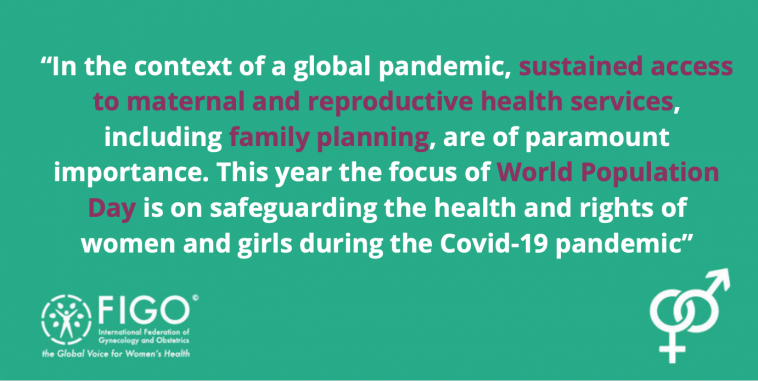World Population Day

Each year ‘World Population Day’ seeks to focus attention and urgency on population issues, including the importance of family planning, maternal health and human rights. The ability to decide if, and when, to have children allows a woman to contribute to society fully and take better care of her family. Yet despite this recognition, millions of women globally do not have access to safe and effective family planning, and its sustained benefits.
Birth spacing is an effective way to reduce maternal, perinatal and child morbidity and mortality, as well as reducing poverty and working towards gender equity. Ensuring that women across the globe have access to and choice of, safe and effective methods of family planning is key to achieving the 2030 Agenda for Sustainable Development, with key targets included in SDGs 3, 5 and 10.
Since 2013 FIGO’s Postpartum Intrauterine Device Initiative (PPIUD) has worked to improve access of women and their families to quality post-partum family planning (PPFP) services in six countries (Bangladesh, Kenya, India, Nepal, Sri Lanka and Tanzania). Through training and capacity building service providers, sustained advocacy, and working in partnerships with local leadership, the initiative has established PFFP counselling and PPIUD service provision in over 56 facilities across the six countries.
Establishing safe and effective PPIUD services was a key goal of the initiative; using a training the trainer approach, providers were trained to deliver balanced counselling in all available PPFP methods, ensuring women were able to make an informed choice. Over the course of the initiative, 10,600 providers, from a range of cadre types, received comprehensive training in family planning counselling, including PPFP, and an additional 9368 received training in both counselling and PPIUD insertion. Across the six countries, 701,175 women received access to quality family counselling, with the option to receive their choice in method of contraception. Of the women counselled, 74,417 women received a PPIUD as their preferred method of family planning.
“I was not using a family planning method before I got pregnant and I had not even heard of PPIUD. I decided to have a PPIUD because I want to make sure I have a proper break after the delivery of my baby. I would recommend PPIUD to other women because good things are not to be kept in the heart, they should be shared. I want them not to have to deliver back-to-back each year. I will suggest to them that they should raise their first baby before thinking of another baby, for a healthy mother and a healthy baby. I would recommend PPIUD as it is a long-lasting method”. PPIUD User, Nepal
In the context of a global pandemic, sustained access to maternal and reproductive health services, including family planning, are of paramount importance. This year the focus of World Population Day is on safeguarding the health and rights of women and girls during the Covid-19 pandemic. Authors at the Guttmacher Institute have estimated that if there were a 10% decline in the use of contraception due to stock outs, unavailable providers, or closed clinics, an additional 48,558,000 women would have an unmet need for contraception worldwide, resulting in 15,401,000 additional unintended pregnancies, 1,745,000 additional women experiencing major obstetric complications without care and 3,325,000 additional women resorting to unsafe abortions. This shows the devastating impact Covid-19 will have on maternal health if reproductive health services are not sustained throughout the pandemic.
Prioritising the provision of contraception and family planning services is essential, as well as the urgent need to expand these services, to ensure all women and girls across the globe can access safe and effective contraceptive methods. PPFP and in particular Long Acting Reversible Contraception (LARC) provide an ideal opportunity to provide women with access to reliable contraception during her hospital stay, something which she would otherwise not have access to.
It’s important that during this pandemic, those women who come to deliver in hospital are able to access all the health care possible to avoid further visits. LARCs are long acting and so there is no need for the women to return to hospital for resupplies as would be the case with short acting methods. PPIUD in particular is cost effective and insertion is relatively painless if done immediately after delivery of the placenta.
FIGO urges OBGYNs around the world to strengthen their immediate postpartum family planning services to include quality counselling on all methods available on their contexts and access to their chosen method. Particular consideration should be given to LARCs which offer a reliable solution to women’s contraceptive needs during this pandemic of which the end is not yet in sight.
This World Population Day, FIGO continues to advocate for the role of PPFP and LARC’s in addressing the unmet need, especially within the context of COVID-19.